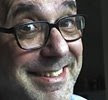People have compared the GOP ad to the seminal Daisy spot created by Tony Schwartz at Doyle, Dane Bernbach for Lyndon Johnon's campaign against Goldwater in 1964. (Watch it on YouTube.)
The GOP even borrowed the copy line, "these are the stakes." from Daisy.
But they only borrowed the beginning of the line. What Johnson actually said in the voice-over to Daisy was this:
"These are the stakes: to make a world in which all of God's children can live or go into the dark. We must either love each other or we must die."Johnson's rhetoric was about "all God's children," and "love." The GOP rhetoric is all about naming and nicknaming enemies that only they can protect us from, (terrorists, axis of evil, Islamofascists, defeatocrats, cut-and-runners).
Furthermore, the implication of the GOP ad is this: if we don't vote for them, Osama will use the bomb. Whereas the implication of the Johnson ad was this: if we didn't vote for him, the U.S. might use the bomb.
Think about that. Imagine in today's climate that you could run on the fear that the U.S. might do the wrong thing. Democrats today are even skittish about denouncing torture lest they reinforce the Republican accusation that Dems are weak.
Copy and rhetoric aside, there's another measure of the difference between the two spots. The GOP ad ignores all of the deeper wisdom about powerful communications that makes Daisy effective. Tony Schwartz discusses Daisy in, The Responsive Chord:
I believe television spots function well as electronic posters for a candidate; i.e., they create auditory and visual stimuli that can evoke a voter's deeply held feelings. Indeed, the best political commercials are similar to Roschach patterns. They provide a context for him to express these feelings...Schwartz built his advertising around resonance. He belived that the audience already had more information than an advertiser could cram into a commercial. The best strategy of a communicator is not to pour things into the audience, but to call up what is already there.
Many people, especially the Repubicans, shouted that the spot accused Senator Goldwater of being trigger-happy. But nowhere in the spot is Goldwater mentioned. There is not even an indirect reference to Goldwater. Indeed, someone unfamiliar with the political climate in 1963 and viewing the spot today will not perceive any allusion at all to Goldwater... The commercial evoked a deep feeling in many people that Goldwater might actually use nuclear weapons. This mistrust was not in the Daisy spot. It was in the people who viewed the commercial.
Are there any resonant Democratic TV spots today? Which ones do you think work this way?
(tags: Bush, GOP, Election, Osama bin Laden, Terror, Advertising, Campaign, Daisy, Politics)




3 comments:
I cross posted this on Kos, where zembian added some info on the literary roots of the LBJ lines. (Homage or plagiarism... your call.)
It's interesting that LBJ's text includes a couple of big-ticket literary references in a row, the first to "East Coker", one of T. S. Eliot's "Four Quartets",
O dark dark dark
We all go into the dark
and the other to W. H. Auden's "September 1, 1939",
All I have is a voice
To undo the folded lie,
The romantic lie in the brain
Of the sensual man-in-the-street
And the lie of Authority
Whose buildings grope the sky:
There is no such thing as the State
And no one exists alone;
Hunger allows no choice
To the citizen or the police;
We must love one another or die.
Auden, famously, decades later and in a more fatalistic mood, went back and changed that last line to
We must love one another and die.
on the principle that, whether or not we love each other, we all die anyway.
Now, can you imagine the guys from that Attention Deficit Theater called NRCC even having heard the name Auden?
A little late, but here goes...Tony Schwartz, the man responsible for recording, editing, creating the "Daisy" ad scoured hours of audio from LBJ's speeches trying to find something that conveyed the emotions he was trying to evoke. A few lines from LBJ's speeches were suggested by DD&B but when Tony listened to them they didn't sound as good as they looked on paper. Tony then cherry-picked lines from a speech which included a poem by WH Auden. Though the lines sound a bit strange upon 1st listen, they have the emotion and feel Tony wanted. So, "homage or plagiarism" or creative editing.
I know this because I am Tony Schwartz's personal assistant.
forrest, Thanks for filling in more of the story.
Post a Comment